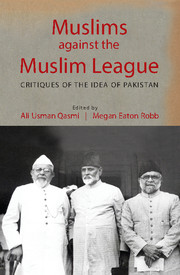Book contents
- Frontmatter
- Contents
- Acknowledgements
- Introduction
- 1 Maulana Husain Ahmad Madani and the Jami'at ‘Ulama-i- Hind: Against Pakistan, against the Muslim League
- 2 The Partition Conundrum: Perspectives, Experiences and Ambiguities from qasbahs in India
- 3 Choudhary Rahmat Ali and his Political Imagination: Pak Plan and the Continent of Dinia
- 4 Differentiating between Pakistan and Napak-istan: Maulana Abul Ala Maududi's Critique of the Muslim League and Muhammad Ali Jinnah
- 5 Advising the Army of Allah: Ashraf Ali Thanawi's Critique of the Muslim League
- 6 The Illusory Promise of Freedom: Mian Iftikhar-ud-Din and the Movement for Pakistan
- 7 Visionary of Another Politics: Inayatullah Khan ‘al-Mashriqi’ and Pakistan
- 8 Nonviolence, Pukhtunwali and Decolonization: Abdul Ghaffar Khan and the Khuda'i Khidmatgar Politics of Friendship
- 9 Islam, Communism and the Search for a Fiction
- 10 Muslim Nationalist or Nationalist Muslim? Allah Bakhsh Soomro and Muslim Politics in 1930s and 1940s Sindh
- 11 Dancing with the Enemy: Sikander Hayat Khan, Jinnah and the Vexed Question of ‘Pakistan’ in a Punjabi Unionist Context
- 12 Religion between Region and Nation: Rezaul Karim, Bengal, and Muslim Politics at the End of Empire
- 13 ‘The Pakistan that is going to be Sunnistan’: Indian Shi'a Responses to the Pakistan Movement
- 14 The Baluch Qaum of Kalat State: Challenging the Ideological and Territorial Boundaries of Pakistan
- Contributors
- Index
4 - Differentiating between Pakistan and Napak-istan: Maulana Abul Ala Maududi's Critique of the Muslim League and Muhammad Ali Jinnah
Published online by Cambridge University Press: 28 February 2018
- Frontmatter
- Contents
- Acknowledgements
- Introduction
- 1 Maulana Husain Ahmad Madani and the Jami'at ‘Ulama-i- Hind: Against Pakistan, against the Muslim League
- 2 The Partition Conundrum: Perspectives, Experiences and Ambiguities from qasbahs in India
- 3 Choudhary Rahmat Ali and his Political Imagination: Pak Plan and the Continent of Dinia
- 4 Differentiating between Pakistan and Napak-istan: Maulana Abul Ala Maududi's Critique of the Muslim League and Muhammad Ali Jinnah
- 5 Advising the Army of Allah: Ashraf Ali Thanawi's Critique of the Muslim League
- 6 The Illusory Promise of Freedom: Mian Iftikhar-ud-Din and the Movement for Pakistan
- 7 Visionary of Another Politics: Inayatullah Khan ‘al-Mashriqi’ and Pakistan
- 8 Nonviolence, Pukhtunwali and Decolonization: Abdul Ghaffar Khan and the Khuda'i Khidmatgar Politics of Friendship
- 9 Islam, Communism and the Search for a Fiction
- 10 Muslim Nationalist or Nationalist Muslim? Allah Bakhsh Soomro and Muslim Politics in 1930s and 1940s Sindh
- 11 Dancing with the Enemy: Sikander Hayat Khan, Jinnah and the Vexed Question of ‘Pakistan’ in a Punjabi Unionist Context
- 12 Religion between Region and Nation: Rezaul Karim, Bengal, and Muslim Politics at the End of Empire
- 13 ‘The Pakistan that is going to be Sunnistan’: Indian Shi'a Responses to the Pakistan Movement
- 14 The Baluch Qaum of Kalat State: Challenging the Ideological and Territorial Boundaries of Pakistan
- Contributors
- Index
Summary
Born in the princely state of Hyderabad Deccan to a family tracing its roots to the aristocracy of Delhi, Maulana Abul Ala Maududi (1903–1979) was an exception among his contemporary ‘ulama. Not formally trained at a madrasa, Maududi showed remarkable understanding of classical Islamic tradition and contemporary Western political thought. Rather than being associated with a mosque or a madrasa, Maududi's career started in journalism. This gave him a unique style of writing through which he could make use of simple and commonly understood language to explain complex ideas. It also gave him a broader understanding of political debates in India on issues such as the future constitution of India, the share of Muslims in power and the possible outcomes of Hindu majoritarian rule after the departure of British.
After serving as the editor of Al-Jami'at, a weekly newspaper belonging to pro-Congress Muslim scholars of the Jami'at ‘Ulama-i-Hind, Maududi started his own journal, Tarjuman-ul-Qur'an. The Tarjuman, which started publication from Hyderabad Deccan in 1933, was not simply a journal for religious articles, but also carried political write-ups. With the change in India's political situation after the imposition of the Government of India Act 1935, the scope of electoral politics and prospects of self-government were considerably enlarged. The question of Muslim participation and share of power in these new conditions was once again at the forefront of acrimonious discussions among different political parties and religious groups. What prompted Maududi's political writings was his visit to Delhi in 1937 after a gap of seven years where he witnessed a major transformation. The city, as he saw it, was losing much of its Muslim character. Purdah among Muslim women, Maududi observed, had become lax and Hindus were making substantial gains under the new constitutional scheme. On his way back to Hyderabad, Maududi shared a compartment with the chief minister of Bombay Presidency and a leader of the Congress party, B. G. Kher. In conversation with him, it occurred to Maududi that Hindu rule would be unbearable for Muslims in India. In this situation, Maududi feared, Muslims would lose their identity, culture and religion and would be submerged in the civilization of the Hindu majority. This prompted Maududi to start writing political essays in his journal.
- Type
- Chapter
- Information
- Muslims against the Muslim LeagueCritiques of the Idea of Pakistan, pp. 109 - 141Publisher: Cambridge University PressPrint publication year: 2017
- 1
- Cited by



